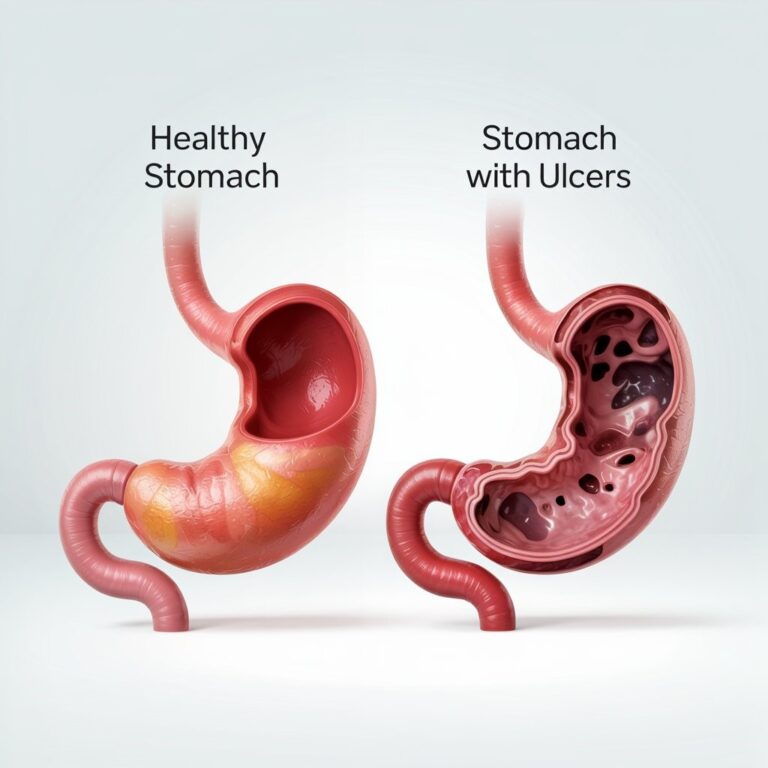Acidity: More Acid Secretion or Poor Digestion?
Introduction
Acidity constitutes a prevalent digestive problem which medical professionals also call acid reflux or heartburn. Acidity develops when stomach acid regurgitates into the esophagus causing pain throughout the chest and throat area. Most people deal with acidity occasionally but continued acidity problems lead to life-altering effects.
The essential question about acidity triggers concern about whether an increase in acid secretion or reduced acid consumption creates this condition. To identify proper treatments as well as lifestyle adjustments one must identify the primary cause of the problem.
Understanding Stomach Acid and Its Role
One should understand fundamental characteristics of stomach acid together with its digestion-related functions.
The digestive process in the stomach heavily depends on hydrochloric acid (HCl) as the primary stomach acid. The acid plays three vital roles in digestion: food breakdown, digestive enzyme activation and protection against bacteria harm. A selected amount of stomach acid forms through an available regulation system from the stomach lining.
The production balance of stomach acid keeps a stable level but disturbed production results in acidity. This text examines the two scenarios by using logical explanations alongside supporting examples.
1. More Acid Secretion: Causes and Consequences
A. Stress and Hormonal Imbalances
Heightened stress produces excessive stomach acid because of its heightened levels. Under stress hormone activation cortisol causes production of higher stomach acid levels by the stomach lining.
A person with long-term work stress and anxiety who maintains employment often experiences repeated acid reflux because their stomach produces excessive acid.
B. Poor Dietary Habits
The intake of spicy or oily as well as acidic foods enhances acid production in the stomach.
Eating fried foods and drinking citrus drinks and carbonated beverages alongside the stomach produces irritation which leads to higher acid production in the stomach.
C. Medications and Drugs
The use of nonsteroidal anti-inflammatory drugs (NSAIDs) presents a medical cause for hyperacidity by causing damage to stomach lining tissue.
A person with chronic pain who takes painkillers may suffer from heartburn as one of its adverse effects.
D. Helicobacter Pylori Infection
H. pylori bacteria damage the stomach lining and as a result increase acid production in patients.
Medical testing of persistent acidity shows an H. pylori infection which requires proper medical intervention.
E. Lifestyle Factors
The stomach acid leaks into the esophagus because smoking combined with heavy alcohol use weakens the lower esophageal sphincter (LES).
Smoking increases the risk of developing gastroesophageal reflux disease (GERD) as it causes LES muscles to become less tense.
2. Less Acid Consumption: Causes and Consequences
Insufficient acid production together with diet-related mistakes creates acidity conditions in the body. When the stomach produces excess acid it makes the situation worse for the affected patient.
A. Skipping Meals or Irregular Eating Habits
A sustained period without food use leads the stomach to build excess acid because it lacks digestive activities.
A student who avoids breakfast followed by a large afternoon meal typically develops acid reflux since stomach acid builds up.
B. Low-Acid Diets
The stomach becomes unable to maintain proper acidity through consuming meals that are minimal in acidic content or through following alkaline diet plans.
A person on an alkaline diet with strict guidelines could develop digestive problems and acidity symptoms.
C. Aging and Reduced Acid Production
The naturally decreasing acid levels in older individuals’ stomachs results in improper digestion and reflux symptoms.
An elderly person with chronic indigestion faces heartburn symptoms because their stomach produces low amounts of acidity.
D. Use of Antacids and Acid Suppressants
Too frequent use of antacids combined with proton pump inhibitors results in extreme stomach acid deficiency.
A patients taking daily antacids for acid reflux will develop acid rebound after they stop using the medication.
Diagnosing the Root Cause
Diagnosing between acid production excess or reduced acid consumption requires medical evaluation. Doctors may recommend:
- pH Monitoring: Measures the acidity level in the esophagus.
- Endoscopy: Checks for inflammation, ulcers, or H. pylori infection.
- Gastric Acid Tests: Evaluates acid secretion levels.
Managing and Preventing Acidity
A. For Excess Acid Production
- Eat smaller, frequent meals.
- Picky selections of foods must exclude spicy, fried and acidic foods which may cause irritation.
- Two effective stress management techniques include practicing yoga alongside performing meditation.
- Limit alcohol and caffeine intake.
Medical professional supervision is needed to prescribe either H2 blockers or proton pump inhibitors medications.
B. For Insufficient Acid Production
- Include fermented foods and probiotics when you want to enhance your digestive process.
- Avoid overusing antacids.
- The digestion of protein in balanced meals will help activate acid secretions.
- The timing of meals should be managed to avoid maintaining extended empty periods between eatings.
Conclusion
The condition of acidity exists in multiple forms while showing different root causes. The major contributing factor toward acid problems is generally excess acid secretion yet not enough acid production combined with inappropriate food selection may also play a role. The initial step toward effective management requires identifying key signs from your body and determining the underlying cause.
The combination of wise food decisions and stress reduction techniques and physician guidance will help you sustain a robust digestive system. Seek medical help from a provider when symptoms continue to get professional treatment recommendations.
.







